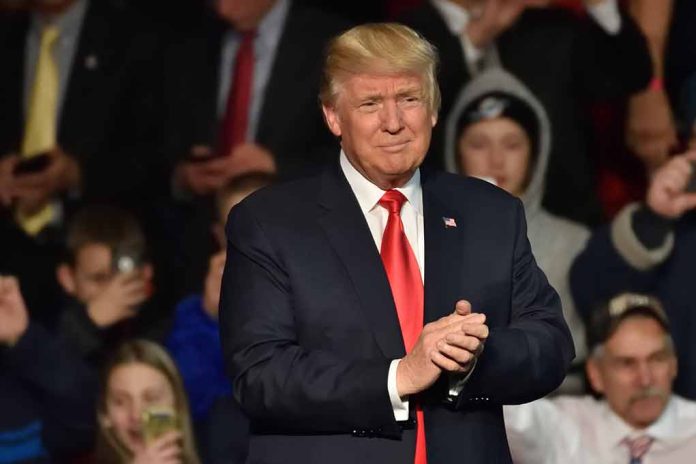
Former President Trump vows to end sanctuary cities and boost law enforcement if re-elected, sparking debate on immigration policies and public safety.
At a Glance
- Trump pledges to eliminate sanctuary cities and strengthen law enforcement during a town hall event
- He plans to use executive orders and the Aliens Act of 1798 to revoke supportive policies for sanctuary jurisdictions
- The former president criticizes Democratic leadership of sanctuary cities
- Trump aims to bring “normalcy” back to American communities by prioritizing citizen safety
- The issue of sanctuary cities remains contentious, with varying definitions and practices across jurisdictions
Trump’s Pledge to End Sanctuary Cities
During a recent town hall event focused on female voters, former President Donald Trump made a bold declaration to eradicate sanctuary cities and enforce stronger law and order policies if he were to be elected again. The announcement came in response to a question from Nancy, a participant who shared the tragic story of her son’s murder at the hands of an undocumented immigrant.
Trump’s stance on sanctuary cities has been a cornerstone of his immigration policy since his first presidential campaign. He has consistently argued that these jurisdictions undermine federal law and pose a threat to public safety. However, the issue is far more complex than it may appear at first glance.
The Complexity of Sanctuary Cities
One of the primary challenges in addressing sanctuary cities is the lack of a clear, universally accepted definition. The term “sanctuary city” varies in interpretation and implementation across different jurisdictions, making it difficult to create a one-size-fits-all policy.
Generally, sanctuary cities are those that limit their cooperation with federal immigration enforcement actions. However, the extent of this limitation can vary significantly. Some jurisdictions may refuse to hold individuals for Immigration and Customs Enforcement (ICE) without a judicial order, while others may only cooperate in cases involving serious criminals.
Trump says he can end sanctuary cities with an executive order.
“ “You can do it with the Aliens Act of 1798. We can move them out of the cities.” #GaPol #Election2024 pic.twitter.com/PWJBCLPLyb
— The Atlanta Voice (@theatlantavoice) October 16, 2024
Legal Challenges and Constitutional Concerns
Trump’s previous attempts to crack down on sanctuary cities have faced significant legal obstacles. In 2017, a federal judge blocked his executive order to cut funding to these jurisdictions, ruling that it was likely unconstitutional and violated local sovereignty.
This legal setback highlights the complex constitutional issues surrounding federal attempts to compel local law enforcement to participate in immigration enforcement. Many sanctuary cities argue that their policies actually enhance public safety by encouraging cooperation between immigrant communities and local law enforcement.
The Debate on Public Safety
Proponents of sanctuary cities often cite research indicating that undocumented immigrants are less likely to commit serious crimes than U.S.-born individuals. They argue that sanctuary policies create trust between immigrant communities and local law enforcement, leading to better crime reporting and community policing.
On the other hand, critics like Sheriff Chuck Jenkins advocate for more cooperation with ICE, arguing that sanctuary policies can allow dangerous criminals to evade deportation. The tragic case of Kate Steinle in San Francisco in 2015 became a rallying point for those opposing sanctuary city policies.
Looking Ahead
As the debate over sanctuary cities continues, it’s clear that any attempt to implement a nationwide policy will face significant challenges. The varied definitions, practices, and legal considerations make it a complex issue that resists simple solutions.
If re-elected, Trump’s ability to fulfill his pledge to end all sanctuary cities will likely depend on navigating these complexities, potentially requiring a combination of executive actions, legislative efforts, and legal battles. As the nation approaches another election cycle, the issue of sanctuary cities remains a contentious and pivotal topic in the broader debate over immigration policy and public safety.














